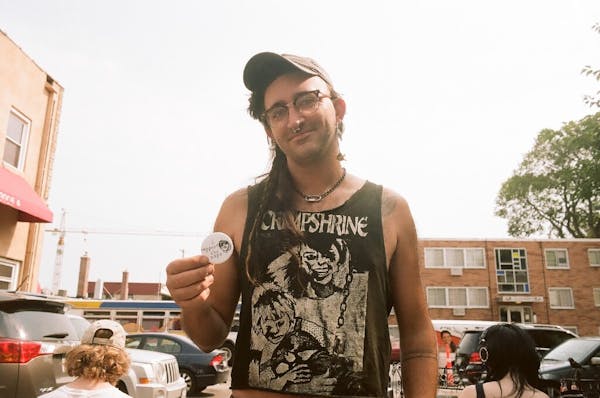I want to honor my friend, John. He acts all tough and vulgar like nothing bothers him, but I've seen him cry. In Iraq, it's all just endless brown, washed out. Sand, bricks, the sky so pale it's barely blue. The horizon goes on forever, no lines, no color. So when we came home, the green made him cry. The color you take for granted. He looks up at trees now still and I catch him bawling his eyes out.
After hearing this monologue from a fellow cast member during rehearsal for "The Veterans Play Project," Matt Delaney had to walk away for a minute, a thumb and forefinger pressed against the inner edges of his eyes.
Delaney, 46, of Coon Rapids, served 17 years in the Army, including a two-year tour in Iraq doing long-range surveillance.
"That's exactly what it's like," he said. "Brown and hot. The only thing missing is the constant lingering smell over everything. No one had to tell you for you to know it was the smell of death. You never took a big deep breath over there like you do back home."
The play, which premieres Friday at Fort Snelling's Base Camp, was created by the troupe Footprints Collective and is being presented by Mixed Blood Theatre.
The stories being told are those of real military personnel, and two-thirds of the 20-member cast served in the military. Before writing a script and holding auditions, director Leah Cooper and her cohorts conducted several story circles with more than 100 veterans of conflicts from Vietnam and the first Gulf War to the more recent wars in Iraq and Afghanistan.
This group, which one vet in the cast joked has become its own platoon, is on a mission that is physically safer than any of those locales. But it has led them into some risky emotional territory. There are extra challenges for the theater pros as well, not least among them working with amateur actors who understandably bring a higher-than-average share of baggage along.
"We love the baggage," Cooper said. "That's why we invited them. What they lack in theater training they more than make up for in authentic world experience, profound emotion and deep perspective."
People with a military background have at least one skill that makes them actually better than most artists at staging drama, she said.
"They have already learned teamwork, and they've done it under life-or-death circumstances. They know how to set aside differences and value each other's assets."
A former software engineer, Cooper was director of the Minnesota Fringe Festival for several years and currently wears several hats on the local theater scene, including as executive director of the Minnesota Theater Alliance. She gained experience directing nonprofessional actors after working with the community-based Cornerstone Theater Company in Los Angeles in 2009. But going in, she didn't expect to have as much in common with the vets as she did.
"Their reasons for serving in the military are similar to mine for being in the arts," she said. "To find more meaning in the world, to be a part of something bigger than you are."
She added, "These guys are just crazy overachievers, fearless. No matter what we throw at them, trust exercises, silly games, they want to be perfect at it."
Many have PTSD and other hidden disabilities they don't talk about, she said. "They don't reveal it because of the stigma, the false civilian perception that once you've had it you're damaged forever."
Set in a fictitious small town going through a debate about turning a sacred space called the Rock into a veterans memorial, the play explores how vets are honored for their service, and the varying feelings they have about that.
"Some of the older vets in the circles, who were in Vietnam, said they didn't want to be thanked, because they don't feel good about it," Cooper said. "Some of the younger ones don't like just being told 'Thank you for your service' by strangers, because people don't know what they're actually saying thanks for. They want people to care enough to just honor them as humans."
Judging from a recent rehearsal, the most moving part of the play comes near the end when, one by one, townspeople including veterans walk up to a podium to speak their minds. The recollections are all real, but most of the vets are telling someone else's story, gleaned from the previous story circles.
Two of those stories came from a vet named Tim, whose PTSD is so severe that his wife came along and held his hand during a circle. One, about how Tim's wife is his own personal "war hero" for standing by him during his post-combat troubles, is delivered so eloquently by 68-year-old veteran Rande Thomas that it's easy to assume he's one of the pro actors. The other is the traumatic memory of ordering others to make airstrikes.
"Tim and his wife drove a long distance to get here," Cooper said. "It was their 30th wedding anniversary. I asked why they wanted to spend that day this way. She said, 'His family, his friends, his co-workers don't want to hear his stories. If you want to hear them, we want to be here to tell them.' "
Kristin Tillotson • 612-673-7046
In heated western Minn. GOP congressional primary, outsiders challenging incumbent

Minnesota Sports Hall of Fame: A class-by-class list of all members

This retired journalist changed professional wrestling from Mankato

